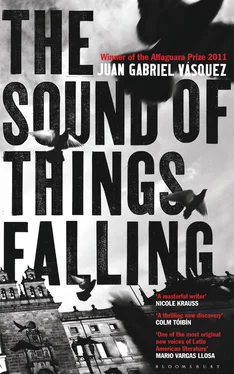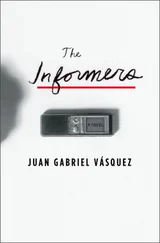Elaine devoted herself to understanding. She asked questions and Ricardo answered them. His father’s burnt face, Ricardo explained over the course of several conversations, that map of skin darker and rougher and more jagged than the desert of Villa de Leyva, had formed part of the landscape that surrounded him his whole life; but not even as a child, when one asks everything and assumes nothing, did Ricardo Laverde take an interest in the causes of what he saw, the difference between his father’s face and everyone else’s. Although it was also possible (Laverde said) that his family hadn’t even given him time to feel that curiosity, for the tale of the accident at Santa Ana had floated among them ever since it happened and never evaporated, being repeated in the most diverse situations and thanks to the widest range of narrators, and Laverde remembered versions heard at Christmas novenas, versions from Friday-afternoon tea parties and others on Sundays at the football stadium, versions on the way to bed in the evening and others on the way to school in the mornings. They talked about the accident, yes, and they did so in every tone of voice and with all sorts of intentions, to demonstrate that planes were dangerous, unpredictable things like rabid dogs (according to his father), or that planes were like Greek gods, always putting people in their place and never tolerating men’s arrogance (according to his grandfather). And many years later he, Ricardo Laverde, would tell of the accident as well, adorning and adulterating it until he realized that it wasn’t necessary. At school, for example, telling the origins of his father’s burnt face was the best way to capture his classmates’ attention. ‘I tried with my grandfather’s war exploits,’ said Laverde. ‘Then I realized no one wants to hear heroic stories, but everyone likes to be told about someone else’s misery.’ And that’s what he would remember, the faces of his classmates when he told them about the accident at Santa Ana and then showed them pictures of his father and his scarred face so they’d see he wasn’t lying.
‘Now I’m sure,’ said Laverde. ‘If nowadays I want to be a pilot, if there’s nothing else that interests me in the world, it’s Santa Ana’s fault. If I end up killing myself in a plane, it’ll be Santa Ana’s fault.’
That story is to blame, said Laverde. It was that story’s fault that he’d accepted his grandfather’s first invitations. It was that story’s fault that he’d started to go to the runways of the Guaymaral Aeroclub to fly with the heroic veteran and to feel alive, more alive than ever. He walked between the Canadian Sabres and managed to get to sit in the cockpits (his surname opened them all), and then managed (again his surname) to get the best flying instructors at the Aeroclub to devote more hours than they’d been paid for to him: the story of Santa Ana was to blame for all that. He would never feel so much like a dauphin as he’d felt during those times, would never again know what it’s like to have a little inherited power. ‘I’ve made good use of it, Elena, I swear,’ he said. ‘I’ve learned well, been a good student.’ His grandfather always said he had the makings of a good pilot. His instructors were veterans too: mostly of the war with Peru, but some who’d flown in Korea and been decorated by the gringos , or at least that’s what was said. And they all agreed that this boy was good, that he had a rare instinct and golden hands and, what was most important, that the planes respected him. And the planes were never wrong.
‘And so that’s how it’s been till now,’ said Laverde. ‘It kills my father, but I’m now the boss of my own life, with one hundred flying hours you become boss of your own life. He spends his days guessing the future, but it’s other people’s future, Elena, my father doesn’t know what’s in mine, and his formulas and statistics can’t tell him either. I’ve wasted a lot of time trying to find out, and only now, in the last few days, have I come to understand the relationship between my life and my dad’s face, between the accident at Santa Ana and this person you see before you, who is going to do great things in life, a grandson of a hero. I’m going to get out of this mediocre life, Elena Fritts. I’m not afraid, I’m going to restore the name Laverde to its rightful place in aviation history. I’m going to be better than Captain Abadía and my family’s going to be proud of me. I’m going to leave this mediocre life and get out of this house where we suffer every time another family invites us for dinner because we’ll have to invite them over in return. I’m going to stop counting centavos as my mother does every morning. I’m not going to have to offer a bed to a gringo so my family will have enough to eat, sorry, no offence, I didn’t mean to offend you. What do you want, Elena Fritts, I’m the grandson of a hero, I’m made for better things. Great things, that’s how it is, I say it and I mean it. No matter whether people like it or not.’
They were on their way down in the cable car, the same way they’d gone up. The sun was setting, and the sky over Bogotá had turned into a gigantic violet blanket. Below them, in the fading light, the pilgrims who’d walked up and were walking down looked like coloured drawing pins on the stone steps. ‘What strange light this city has,’ said Elaine Fritts. ‘You close your eyes for a second and it’s already night by the time you open them.’ A gust of wind shook the cabin, but this time the tourists didn’t cry out. It was cold. The wind sighed as it blew through the cabin. Elaine, her arm around Ricardo Laverde, leaning on the horizontal bar that protected the window, found herself suddenly in the dark. The heads of the other passengers were vague silhouettes against the background of the sky, black on black. Ricardo’s breathing reached her in waves, a smell of tobacco and clean water, and there, floating over the eastern hills, watching the city light itself up for the night, Elaine wished the cabin would never reach the bottom. She thought, perhaps for the first time, that a person like her could live in a country like this. In more than one sense, she thought, this country was still just starting, barely discovering its place in the world, and she wanted to be part of that discovery.
The deputy director of Peace Corps Colombia was a small, thin, distant man with thick-framed glasses like Henry Kissinger’s and a knitted tie. He received Elaine in his shirtsleeves, which would not have been odd if the man hadn’t been wearing a short-sleeved shirt as if he were in the unbearable heat of Barranquilla or Girardot instead of freezing to death up on this plateau. He used so much brilliantine in his black hair that the light from the neon strip lighting could produce the illusion of premature greying at his temples or white roots in his parting as straight as that of any military officer. She couldn’t tell if he was North American or local, or an American son of locals, or a local son of Americans; there were no clues, no posters on the walls or music playing anywhere or books on the shelves that might allow someone to guess at his life, his origins. He spoke perfect English, but his surname — the long surname that looked up at Elaine from the desk, carved in a brass sign that looked solid — was Latin American or at least Spanish, Elaine didn’t know if there was any difference. The interview was routine: all the Peace Corps volunteers had passed or would pass through this dark office, sit in this uncomfortable chair where Elaine now half-rose to smooth her long aquamarine skirt with her hands. Here, before the lean and aloof Mr Valenzuela, all those who’d been trained in the CEUCA sat sooner or later and listened to a short speech on how the training was approaching its end, how the volunteers would soon be travelling to the places where they would fulfil their mission, speeches on generosity and responsibility and the opportunity to make a difference. They listened to the words permanent site placement and then immediately the same question: ‘Do you have any preference?’ And the volunteers pronounced recently acquired names of unknown content: Bolívar, Valledupar, Magdalena, Guajira. Or Quindío (which they’d pronounce Kwindio ). Or Cauca (pronounced Coka ). Then they’d be transferred to a place near their final destination, a sort of intermediate stop where they’d spend three weeks at the side of a volunteer with more experience. Field training, it was called. All this was decided in a half-hour interview.
Читать дальше












